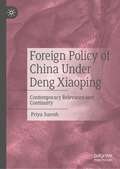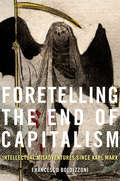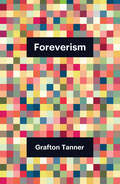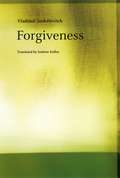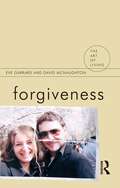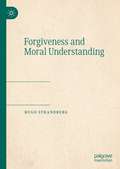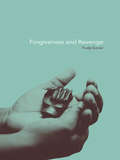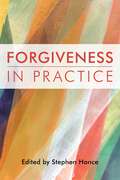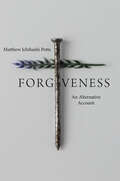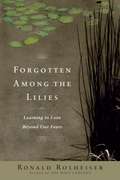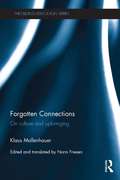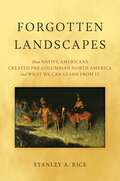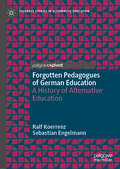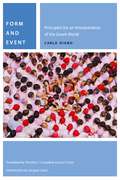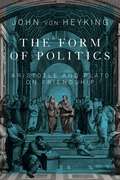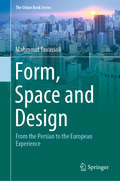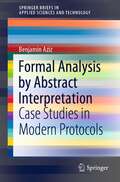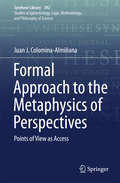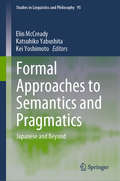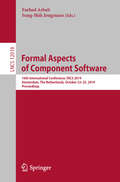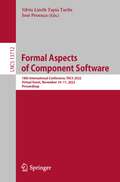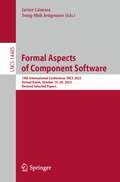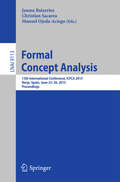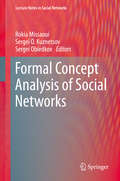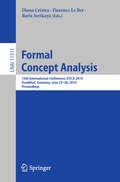- Table View
- List View
Foreign Policy of China Under Deng Xiaoping: Contemporary Relevance and Continuity
by Priya SureshThe book examines, linking two key variables – ‘political leadership’ and ‘foreign policy’ – the role of Deng Xiaoping in China’s foreign policy shift after Mao in politico-strategic and economic domains. The book finds out that guided by his own personality, worldview, experience, pragmatism, belief and style Deng attempted to resolve the long-standing domestic and foreign policy issues. Most importantly, Deng moved from the primacy of politics to economic modernisation which resulted in far-reaching changes in China’s external engagement. The book's central inquiry is to assess the contemporary relevance of Deng’s foreign policy paradigm. It establishes that the relevance of Deng’s policy continues in the present context except for China’s pro-activeness towards issues pertaining to its territorial integrity and sovereignty. Using China’s case, the study advances the framework of understanding pertaining to the role of political leadership in foreign policy.
Foretelling the End of Capitalism: Intellectual Misadventures since Karl Marx
by Francesco BoldizzoniIntellectuals since the Industrial Revolution have been obsessed with whether, when, and why capitalism will collapse. This riveting account of two centuries of failed forecasts of doom reveals the key to capitalism’s durability. Prophecies about the end of capitalism are as old as capitalism itself. None have come true. Yet, whether out of hope or fear, we keep looking for harbingers of doom. In Foretelling the End of Capitalism, Francesco Boldizzoni gets to the root of the human need to imagine a different and better world and offers a compelling solution to the puzzle of why capitalism has been able to survive so many shocks and setbacks. Capitalism entered the twenty-first century triumphant, its communist rival consigned to the past. But the Great Recession and worsening inequality have undermined faith in its stability and revived questions about its long-term prospects. Is capitalism on its way out? If so, what might replace it? And if it does endure, how will it cope with future social and environmental crises and the inevitable costs of creative destruction? Boldizzoni shows that these and other questions have stood at the heart of much analysis and speculation from the early socialists and Karl Marx to the Occupy Movement. Capitalism has survived predictions of its demise not, as many think, because of its economic efficiency or any intrinsic virtues of markets but because it is ingrained in the hierarchical and individualistic structure of modern Western societies. Foretelling the End of Capitalism takes us on a fascinating journey through two centuries of unfulfilled prophecies. An intellectual tour de force and a plea for political action, it will change our understanding of the economic system that determines the fabric of our lives.
Foreverism (Theory Redux)
by Grafton TannerWhat do cinematic “universes,” cloud archiving, and voice cloning have in common? They’re in the business of foreverizing – the process of revitalizing things that have degraded, failed, or disappeared so that they can remain active in the present. To foreverize something is to reanimate it, to enclose and protect it from time and the elements, and to eradicate the feeling of nostalgia that accompanies loss. Foreverizing is a bulwark against instability, but it isn’t an infallible enterprise. That which is promised to last forever often does not, and that which is disposed of can sometimes last, disturbingly, forever. In this groundbreaking book, American philosopher Grafton Tanner develops his theory of foreverism: an anti-nostalgic discourse that promises growth without change and life without loss. Engaging with pressing issues from the ecological impact of data storage to the rise of reboot culture, Tanner tracks the implications of a society averse to nostalgia and reveals the new weapons we have for eliminating it.
Forgiveness
by Vladimir JankélévitchPhilosopher Vladimir Jankélévitch has only recently begun to receive his due from the English-speaking world, thanks in part to discussions of his thought by Jacques Derrida, Emmanuel Lévinas, and Paul Ricoeur. His international readers have long valued his unique, interdisciplinary approach to philosophy’s greatest questions and his highly readable writing style. Originally published in 1967, Le Pardon, or Forgiveness, is one of Jankélévitch’s most influential works. In it, he characterizes the ultimate ethical act of forgiving as behaving toward the perpetrator as if he or she had never committed the action, rather than merely forgetting or rationalizing it—a controversial notion when considering events as heinous as the Holocaust. Like so many of Jankélévitch’s works, Forgiveness transcends standard treatments of moral problems, not simply generating a treatise on one subject but incorporating discussions of topics such as free will, giving, creativity, and temporality. Translator Andrew Kelley masterfully captures Jankélévitch’s melodic prose and, in a substantive introduction, reviews his life and intellectual contributions. Forgiveness is an essential part of that legacy, and this indispensable English translation provides key tools for understanding one of the great Western philosophers of the twentieth century.
Forgiveness (The Art of Living)
by Eve Garrard David McNaughtonForgiveness usually gets a very good press in our culture: we are deluged with self-help books and television shows all delivering the same message, that forgiveness is good for everyone, and is always the right thing to do. But those who have suffered seriously at the hands of others often and rightly feel that this boosterism about forgiveness is glib and facile. Perhaps forgiveness is not always desirable, especially where the wrongdoing is terrible or the wrongdoer unrepentant. In this book, Garrard and McNaughton suggest that the whole debate suffers from a crippling lack of clarity about what forgiveness really amounts to. They argue that it is more difficult, complex and troubling than many of its advocates suppose. Nevertheless, they conclude, a proper understanding of forgiveness allows us to avoid cheap and shallow forms of it, and enables us to see why it is right and admirable to forgive even unrepentant wrongdoers.
Forgiveness and Moral Understanding
by Hugo StrandbergThis book sets out to deepen our moral understanding by thinking about forgiveness: what does it mean for our understanding of morality that there is such a thing as forgiveness? Forgiveness is a challenge to moral philosophy, for forgiveness challenges us: it calls me to understand my relations to others, and thereby myself, in a new way. Without arguing for or against forgiveness, the present study tries to describe these challenges. These challenges concern both forgiving and asking for forgiveness. The latter is especially important in this context: what does the need to be forgiven mean? In the light of such questions, central issues in the philosophy of forgiveness are critically discussed, about the reasons and conditions for forgiveness, but mostly the focus is on new questions, about the relation of forgiveness to plurality, virtue, death, the processes of moral change and development, and the possibility of feeling at home in the world.
Forgiveness and Revenge
by Trudy GovierForgiveness and Revenge is a powerful exploration of our attitudes to serious wrongdoings and a careful examination of the values that underlie our thinking about revenge and forgiveness.From adulterous spouses to terrorist factions, we are surrounded by wrongdoing, yet we rarely agree which response is appropriate. The problem of how to respond realistically and sensitively to the wrongs of the past remains a perplexing one. Trudy Govier clarifies our thinking on this subject by examining the moral and practical impact of revenge and forgiveness, both personal and political.Forgiveness and Revenge offers much-needed clarity and reason where emotions often prevail. It is essential reading for anyone interested in the ethics of attitudes to wrongdoing.
Forgiveness in Practice
by Howard Cooper Chris Cook Deborah Bowman Gwen Adshead Richard Carter Graham Spencer Marina Cantacuzino Christiane Sanderson Robin Shohet Steve Nolan Marian Liebmann Stephen Cherry Liz Gulliford Stephen Hance Anthony Bash Reza Shah-Kazemi Vajragupta Jesse Butler Meadows Honor Rhodes Amanda Boorman Lord Alderdice Wendy DossettForgiveness has often viewed as a religious obligation but is increasingly being advocated as a means of healing, release and promoting wellbeing. Forgiveness is variously viewed as a duty, virtue or cure, but when it comes to practising forgiveness in real life we find it is always caught up in the complexity of the situation. This book shines a light on how we tend to think about forgiveness in practice, including examples from social work, family therapy, chaplaincy and criminal justice.The book contains many different perspectives on how we think about forgiveness, including overviews of four major religions and reflections from those working in the healing professions. Without advocating a particular approach this book raises important questions around self-forgiveness and forgiving institutions and encourages the reader to think again about forgiveness and how it impacts, challenges and transforms relationships.
Forgiveness: An Alternative Account
by Matthew Ichihashi PottsA deeply researched and poignant reflection on the practice of forgiveness in an unforgiving world Matthew Ichihashi Potts explores the complex moral terrain of forgiveness, which he claims has too often served as a salve to the conscience of power rather than as an instrument of healing or justice. Though forgiveness is often linked with reconciliation or the abatement of anger, Potts resists these associations, asserting instead that forgiveness is simply the refusal of retaliatory violence through practices of penitence and grief. It is an act of mourning irrevocable wrong, of refusing the false promises of violent redemption, and of living in and with the losses we cannot recover. Drawing on novels by Kazuo Ishiguro, Marilynne Robinson, Louise Erdrich, and Toni Morrison, and on texts from the early Christian to the postmodern, Potts diagnoses the real dangers of forgiveness yet insists upon its enduring promise. Sensitive to the twenty-first-century realities of economic inequality, colonial devastation, and racial strife, and considering the role of forgiveness in the New Testament, the Christian tradition, philosophy, and contemporary literature, this book heralds the arrival of a new and creative theological voice.
Forgotten Among the Lilies: Learning to Love Beyond Our Fears
by Ronald RolheiserThe author of The Holy Longing explores the debilitating obsessions that often dominate our lives and offers down-to-earth guidance for learning to leave our fears, anxieties, and guilt "forgotten among the lilies." "Rarely do we taste the food we eat or the coffee we drink. Instead we go through our days too preoccupied, too compulsive, and too dissatisfied to really be able to be present for and celebrate our own lives," Ronald Rolheiser writes in the introduction to this powerful collection of essays...
Forgotten Connections: On culture and upbringing (Theorizing Education)
by Klaus MollenhauerKlaus Mollenhauer’s Forgotten Connections: On Culture and Upbringing is internationally regarded as one of the most important German contributions to educational and curriculum theory in the 20th century. Appearing here in English for the first time, the book draws on Mollenhauer’s concern for social justice and his profound awareness of the pedagogical tension between the inheritance of the past and the promise of the future. The book focuses on the idea of Bildung, in which philosophy and education come together to see upbringing and maturation as being much more about holistic experience than skill development. This translation includes a detailed introduction from Norm Friesen, the book’s translator and editor. This introduction contextualizes the original publication and discusses its application to education today. Although Mollenhauer’s work focused on content and culture, particularly from a German perspective, this book draws on philosophy and sociology to offer internationally relevant responses to the challenge of communicating cultural values and understandings to new generations. Forgotten Connections will be of value to students, researchers and practitioners working in the fields of education and culture, curriculum studies, and in educational and social foundations.
Forgotten Landscapes: How Native Americans Created Pre-Columbian North America and What We Can Learn From It
by Stanley A. RiceRediscover the thriving civilizations of Pre-Columbian America and learn how Native ingenuity transformed the landscape into a flourishing world we can still learn from today North America was not empty nor were its inhabitants savages when Europeans arrived in 1492. Quite the opposite, North America was thickly populated by indigenous people who lived in clean cities, had a thriving economy, and transformed the landscape into bountiful productivity. Forgotten Landscapes reveals the incredible extent to which Native Americans manipulated and shaped their surrounding environs through agricultural practices and urban engineering, resulting in one of the most prosperous civilizations of their time. Well before European contact, North American cities and villages were bound together by an intricate trade network. Today, Spiro Mound in rural Oklahoma is a few piles of dirt, not on the road to anywhere. But at the time of the Mississippian civilization, about a thousand years ago, it was one of the largest cities in the world. With the controlled use of fire, Native Americans had transformed thick forests into open woodlands and expanded the ranges of prairies. Through organized hunting, Natives controlled the populations of prey animals such as passenger pigeons, and when Native populations grew large enough, they developed agriculture including irrigated crops, and even orchards. In this fascinating and overdue book, author Stanley A. Rice shows readers the Pre-Columbian landscape of America that has been largely forgotten.
Forgotten Pedagogues of German Education: A History of Alternative Education (Palgrave Studies in Alternative Education)
by Ralf Koerrenz Sebastian EngelmannThis book introduces six pedagogues from the German context to an English-speaking audience, and demonstrates their significant contribution to the field of alternative education. First and foremost, the authors emphasise the importance of understanding the history of education, to realise that in fact what we understand as ‘normal’ today is by no means the only course history could have taken. The quest for alternative ways of schooling goes back to the late eighteenth century, where educational thinkers advocated various approaches in the face of rapid societal change. The chosen six thinkers are not well known in the English-speaking scientific community, and some are even infrequently cited in the German context. In offering an historic and systematic introduction to concepts that can frame Alternative Education in different ways, this book allows the reader to critically reevaluate present forms of education by using the past as a mirror.
Form and Event: Principles for an Interpretation of the Greek World (Commonalities)
by Carlo DianoCarlo Diano’s Form and Event has long been known in Europe as a major work not only for classical studies but even more for contemporary philosophy. Already available in Italian, French, Spanish, and Greek, it appears here in English for the first time, with a substantial Introduction by Jacques Lezra that situates the book in the genealogy of modern political philosophy.Form and Event reads the two classical categories of its title phenomenologically across Aristotle, the Stoics, and especially Homer. By aligning Achilles with form and Odysseus with event, Diano links event to embodied and situated subjective experience that simultaneously finds its expression in a form that objectifies that experience. Form and event do not exist other than as abstractions for Diano but they do come together in an intermingling that Diano refers to as the “eventic form.” On Diano’s reading, eventic forms interweave subjectively situated and embodied experiences, observable in all domains of human and nonhuman life.A stunning interpretation of Greek antiquity that continues to resonate since its publication in 1952, Form and Event anticipates the work of such French and Italian post-war thinkers as Gilles Deleuze, Alain Badiou, Roberto Esposito, and Giorgio Agamben.
Form of Politics: Aristotle and Plato on Friendship
by John Von HeykingFor statesmen, friendship is the lingua franca of politics. Considering the connections between personal and political friendship, John von Heyking's The Form of Politics interprets the texts of Plato and Aristotle and emphasizes the role that friendship has in enduring philosophical and contemporary political contexts. Beginning with a discussion on virtue-friendship, described by Aristotle and Plato as an agreement on what qualifies as the pursuit of good, The Form of Politics demonstrates that virtue and political friendship form a paradoxical relationship in which political friendships need to be nourished by virtue-friendships that transcend the moral and intellectual horizons of the political society. Von Heyking then examines Aristotle's ethical and political writings - which are set within the boundaries of political life - and Plato's dialogues on friendship in Lysis and the Laws, which characterize political friendship as festivity. Ultimately, arguing that friendship is the high point of a virtuous political life, von Heyking presents a fresh interpretation of Aristotle and Plato's political thought, and a new take on the most essential goals in politics. Inviting reassessment of the relationship between friendship and politics by returning to the origins of Western philosophy, The Form of Politics is a lucid work on the foundations of political cooperation.
Form, Space and Design: From the Persian to the European Experience (The Urban Book Series)
by Mahmoud TavassoliThis book studies the principles of urban spatial organization of historic cities. It can be considered a guide to design, presenting qualitative criteria to satisfy practical needs. The subject is explored through interconnected chapters, each addressing an important aspect of form-space and design values, knowledge and our present problems. In this book the interpretation is artistic and socio-cultural. Discussion is not concentrated on singular urban space but on interrelated spaces and elements across the city, and complexes. Considering the comparative aspects of study, the reader will notice that despite cultural differences, there is a common understanding in artistic creativity and sensibility in the presented examples.
Formal Analysis by Abstract Interpretation: Case Studies in Modern Protocols (SpringerBriefs in Applied Sciences and Technology)
by Benjamin AzizThe book provides a gentle introduction and definition of the denotational-based abstract interpretation method. The book demonstrates how the above method of formal analysis can be used, not only to address the security of systems, but other more general and interesting properties related to the testing, mutating and semantic ambiguity resolution of protocols. The book presents three case studies, all related to current complex protocols and standards used in industry, particularly in the context of IoT and Industry 4.0.
Formal Approach to the Metaphysics of Perspectives: Points of View as Access (Synthese Library #392)
by Juan J. Colomina-AlmiñanaThis book offers a metaphysical development of the notion of perspective. By explaining the functional nature of point of view, and by providing a concrete definition of point of view as a window through which to see the world, it offers a scientific realist theory that explains that points of view are real structures that ground properties and objects as well as perspectives. The notion of point of view has been of key importance in the history of philosophy, and different philosophical schools have used this notion to conduct analyses from the external reality to the inner phenomenal status, or even to construct an entire philosophical system. However, there has been a lack of systematic analysis of what a point of view is and what its structure is; this book fills the gap in the literature and makes the transition between semantics and epistemology, and the philosophy of science.
Formal Approaches to Semantics and Pragmatics: Japanese and Beyond (Studies in Linguistics and Philosophy #95)
by Katsuhiko Yabushita Kei Yoshimoto Elin McCreadyThis volume presents an exploration of a wide variety of new formal methods from computer science, biology and economics that have been applied to problems in semantics and pragmatics in recent years. Many of the contributions included focus on data from East Asian languages, particularly Japanese and Korean. The collection reflects on a range of new empirical issues that have arisen, including issues related to preference, evidentiality and attention. Separated into several sections, the book presents discussions on: information structure, speech acts and decisions, philosophical themes in semantics and new formal approaches to semantic and pragmatic theory. Its overarching theme is the relation between different kinds of content, from a variety of perspectives. The discussions presented are both theoretically innovative and empirically motivated.
Formal Aspects of Component Software: 16th International Conference, FACS 2019, Amsterdam, The Netherlands, October 23–25, 2019, Proceedings (Lecture Notes in Computer Science #12018)
by Farhad Arbab Sung-Shik JongmansThis book constitutes the thoroughly revised selected papers from the 16th International Conference on Formal Aspects of Component Software, FACS 2019, held in Amsterdam, The Netherlands, in October 2019.The 9 full papers presented together with 9 full papers and 3 short papers as well as 2 other papers were carefully reviewed and selected from 27 submissions. FACS 2019 is concerned with how formal methods can be used to make component-based and service-oriented software development succeed. Formal methods have provided a foundation for component-based software by successfully addressing challenging issues such as mathematical models for components, composition and adaptation, or rigorous approaches to verification, deployment, testing, and certification.
Formal Aspects of Component Software: 18th International Conference, FACS 2022, Virtual Event, November 10–11, 2022, Proceedings (Lecture Notes in Computer Science #13712)
by José Proença Silvia Lizeth Tapia TarifaThis book constitutes the thoroughly revised selected papers from the 18th International Symposium, FACS 2022, which was held online in November 2022.The 12 full papers and 1 short paper were carefully reviewed and selected from 25 submissions. FACS 2021 is focusing on the areas of component software and formal methods in order to promote a deeper understanding of how formal methods can or should be used to make component-based software development succeed.
Formal Aspects of Component Software: 19th International Conference, FACS 2023, Virtual Event, October 19-20, 2023, Revised Selected Papers (Lecture Notes in Computer Science #14485)
by Sung-Shik Jongmans Javier CámaraThis book constitutes the refereed proceedings of the 19th International Conference on Formal Aspects of Component Software, FACS 2023, which took place virtually during October 19-20, 2023.The 11 full papers included in this book were carefully reviewed and selected from 23 submissions. They were organized in topical sections as follows: cloud computing, cyber-physical and critical systems, and the Internet of Things.
Formal Concept Analysis
by Jaume Baixeries Christian Sacarea Manuel Ojeda-AciegoThis book constitutes the refereed proceedings of the 13th International Conference on Formal Concept Analysis, ICFCA 2015, held in Neja, Spain, in June 2015. The 16 revised full papers presented were carefully reviewed and selected from 38 submissions. The topics in this volume cover theoretical aspects of FCA; methods and applications of FCA to different fields and enhanced FCA that show new trends in FCA, for instance, pattern structures of fuzzy FCA.
Formal Concept Analysis of Social Networks (Lecture Notes in Social Networks)
by Rokia Missaoui Sergei O. Kuznetsov Sergei ObiedkovThe book studies the existing and potential connections between Social Network Analysis (SNA) and Formal Concept Analysis (FCA) by showing how standard SNA techniques, usually based on graph theory, can be supplemented by FCA methods, which rely on lattice theory. The book presents contributions to the following areas: acquisition of terminological knowledge from social networks, knowledge communities, individuality computation, other types of FCA-based analysis of bipartite graphs (two-mode networks), multimodal clustering, community detection and description in one-mode and multi-mode networks, adaptation of the dual-projection approach to weighted bipartite graphs, extensions to the Kleinberg's HITS algorithm as well as attributed graph analysis.
Formal Concept Analysis: 15th International Conference, ICFCA 2019, Frankfurt, Germany, June 25–28, 2019, Proceedings (Lecture Notes in Computer Science #11511)
by Florence Le Ber Diana Cristea Baris SertkayaThis book constitutes the proceedings of the 15th International Conference on Formal Concept Analysis, ICFCA 2019, held in Frankfurt am Main, Germany, in June 2019.The 15 full papers and 5 short papers presented in this volume were carefully reviewed and selected from 36 submissions. The book also contains four invited contributions in full paper length. The field of Formal Concept Analysis (FCA) originated in the 1980s in Darmstadt as a subfield of mathematical order theory, with prior developments in other research groups. Its original motivation was to consider complete lattices as lattices of concepts, drawing motivation from philosophy and mathematics alike. FCA has since then developed into a wide research area with applications much beyond its original motivation, for example in logic, data mining, learning, and psychology.
